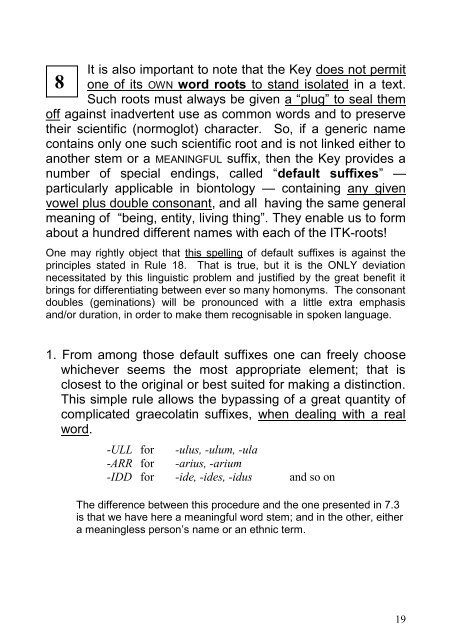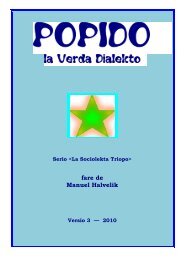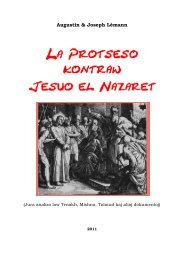the TRIMERAL SYSTEM in BIOLOGICAL TAXONOMY - universala ...
the TRIMERAL SYSTEM in BIOLOGICAL TAXONOMY - universala ...
the TRIMERAL SYSTEM in BIOLOGICAL TAXONOMY - universala ...
You also want an ePaper? Increase the reach of your titles
YUMPU automatically turns print PDFs into web optimized ePapers that Google loves.
It is also important to note that <strong>the</strong> Key does not permit<br />
8<br />
one of its OWN word roots to stand isolated <strong>in</strong> a text.<br />
Such roots must always be given a “plug” to seal <strong>the</strong>m<br />
off aga<strong>in</strong>st <strong>in</strong>advertent use as common words and to preserve<br />
<strong>the</strong>ir scientific (normoglot) character. So, if a generic name<br />
conta<strong>in</strong>s only one such scientific root and is not l<strong>in</strong>ked ei<strong>the</strong>r to<br />
ano<strong>the</strong>r stem or a MEANINGFUL suffix, <strong>the</strong>n <strong>the</strong> Key provides a<br />
number of special end<strong>in</strong>gs, called “default suffixes” —<br />
particularly applicable <strong>in</strong> biontology — conta<strong>in</strong><strong>in</strong>g any given<br />
vowel plus double consonant, and all hav<strong>in</strong>g <strong>the</strong> same general<br />
mean<strong>in</strong>g of “be<strong>in</strong>g, entity, liv<strong>in</strong>g th<strong>in</strong>g”. They enable us to form<br />
about a hundred different names with each of <strong>the</strong> ITK-roots!<br />
One may rightly object that this spell<strong>in</strong>g of default suffixes is aga<strong>in</strong>st <strong>the</strong><br />
pr<strong>in</strong>ciples stated <strong>in</strong> Rule 18. That is true, but it is <strong>the</strong> ONLY deviation<br />
necessitated by this l<strong>in</strong>guistic problem and justified by <strong>the</strong> great benefit it<br />
br<strong>in</strong>gs for differentiat<strong>in</strong>g between ever so many homonyms. The consonant<br />
doubles (gem<strong>in</strong>ations) will be pronounced with a little extra emphasis<br />
and/or duration, <strong>in</strong> order to make <strong>the</strong>m recognisable <strong>in</strong> spoken language.<br />
1. From among those default suffixes one can freely choose<br />
whichever seems <strong>the</strong> most appropriate element; that is<br />
closest to <strong>the</strong> orig<strong>in</strong>al or best suited for mak<strong>in</strong>g a dist<strong>in</strong>ction.<br />
This simple rule allows <strong>the</strong> bypass<strong>in</strong>g of a great quantity of<br />
complicated graecolat<strong>in</strong> suffixes, when deal<strong>in</strong>g with a real<br />
word.<br />
-ULL for -ulus, -ulum, -ula<br />
-ARR for -arius, -arium<br />
-IDD for -ide, -ides, -idus and so on<br />
The difference between this procedure and <strong>the</strong> one presented <strong>in</strong> 7.3<br />
is that we have here a mean<strong>in</strong>gful word stem; and <strong>in</strong> <strong>the</strong> o<strong>the</strong>r, ei<strong>the</strong>r<br />
a mean<strong>in</strong>gless person’s name or an ethnic term.<br />
19






